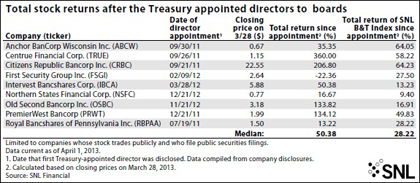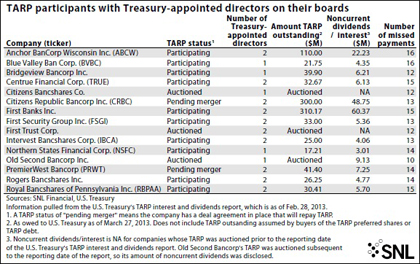SNL Report: Treasury as boardroom recruiter?
SNL Report: TARP banks with gov't. appointed directors have stronger record
- |
- Written by SNL Financial

By Maria Tor and Nathan Stovall, SNL Financial staff writers
TARP participants with Treasury-appointed directors have outperformed the broader bank group and many have taken steps to pay the government back.
For a larger version of the table, please click on the image or click here.
The Treasury has the right to appoint directors at TARP participants' boards if they have deferred dividend payments on their TARP preferred shares for at least six quarters. The Treasury had exercised that right only 15 times, even though more than 100 banks have missed six payments. Treasury says it prioritizes these types of elections in part by focusing on institutions that have at least a $25 million investment from the government.
Among the 103 institutions crossing the threshold of six missed dividend payments, only one, Westminster, Calif.-based Saigon National Bank, has missed all 17 payments. This does not include companies that have converted their initial investment into mandatorily convertible preferred stock or common stock. Saigon National has declined to have a Treasury observer attend board meetings.
Saigon National is not alone in its rejection of the Treasury's request to send an observer to its board. Twelve banks in total have rejected such a request, while 48 other banks have accepted the request.
Treasury representatives on the board
Treasury-appointed directors all seem to have deep experience in the banking industry. A few of the Treasury-appointed directors previously served as consultants to banks, worked in banking and regulatory practices at law firms, or served as former regulators. (For a list of frequently asked questions regarding directors appointed under the Capital Purchase Program, click here.) However, most of the Treasury-appointed directors are longtime bankers, with more than 20 years of experience in the industry.
Treasury seems to have benefited when banks have accepted or been forced to accept the involvement of these directors. Banks with Treasury-appointed directors have outperformed the broader indexes substantially and, importantly, nine of the 15 banks that have taken on a Treasury-appointed director (or two) have found ways or taken steps to pay the Treasury back, either by agreeing to sell to another institution, recapitalizing their balance sheet, or participating in the Treasury's auction process.
For a larger version of the table, please click on the image or click here.
Impact on bank strategies
The stocks of the publicly traded banks that have taken on Treasury-appointed directors have outperformed other bank stocks by nearly 2-to-1 since those directors came aboard. SNL data shows that the stocks of the nine publicly traded banks have boasted median gains of 50.38% since taking on Treasury-appointed directors, compared to a median gain of 28.22% in the SNL Bank & Thrift Index during the same time periods. The outperformance is notable since the institutions missed TARP dividend payments only after experiencing some pain.
A few of the banks that have outperformed have taken steps to improve their profitability since a Treasury-appointed director joined the company or they have decided to partner with another institution. Citizens Republic Bancorp Inc. and PremierWest Bancorp both have significantly outperformed the rest of the bank group since agreeing to sell to larger entities. Both banks announced their mergers less than a year after two Treasury-appointed directors joined their respective boards.
Some other banks such as Old Second Bancorp Inc. and Intervest Bancshares Corp. have outperformed the bank group after the Treasury announced that the institutions would participate in its TARP auction process. Centrue Financial Corp. has enjoyed the greatest outperformance relative to the bank group, with its shares jumping after announcing plans to cut down on expenses by deregistering its stock in conjunction with the JOBS Act. The bank also said it may take part in the Treasury's pooled TARP auctions.
Getting out from under the TARP
Treasury has completed 15 TARP auctions to date, with close to 125 banks exiting the government's cover through the process, which provides at least partial repayment to Treasury. The institutions that participate in the auctions no longer face any possible pressure from Treasury to raise capital to repay the funds they received through TARP. The auctions might also offer institutions an opportunity to buy back their TARP preferred shares at a discount to par, since investors have purchased TARP preferred shares in the auctions at an average discount of 16%, according to SNL's calculations.
Not all banks that have taken on Treasury-appointed directors have found ways to pay the government back. First Banks Inc. and Anchor BanCorp Wisconsin Inc. both have failed to raise capital despite continued efforts to do so.
Meanwhile, First Security Group Inc., which has missed 13 TARP dividend payments, recently entered into several agreements to secure much-needed funds. With the recapitalization, the Treasury agreed to take a substantial discount on its investment in the company in exchange for common stock.
Although the transaction would represent a discount, it would offer the Treasury some form of repayment after the company had been delinquent on its dividend payments for more than three years. Repaying the government after going delinquent is not unique to banks with Treasury-appointed directors though.
Eight companies managed to have their delinquent dividends repaid in the 2012 fourth quarter alone. For instance, BancTrust Financial Group sold to Trustmark Corp., resulting in the redemption of BancTrust's TARP and payment of three outstanding dividends. The seven other companies were Bankers' Bank of the West Bancorp Inc., BNCCORP Inc., Carolina Bank Holdings Inc., Intermountain Community Bancorp, Monadnock Bancorp Inc., Pacific International Bancorp Inc., and Standard Bancshares Inc.
[This article was posted on April 4, 2013, on the website of Banking Exchange, www.bankingexchange.com, and is copyright 2013 by the American Bankers Association.]
Tagged under Management, Financial Trends,
Related items
- How Banks Can Unlock Their Full Potential
- JP Morgan Drops Almost 5% After Disappointing Wall Street
- Banks Compromise NetZero Goals with Livestock Financing
- OakNorth’s Pre-Tax Profits Increase by 23% While Expanding Its Offering to The US
- Unlocking Digital Excellence: Lessons for Banking from eCommerce Titans
















